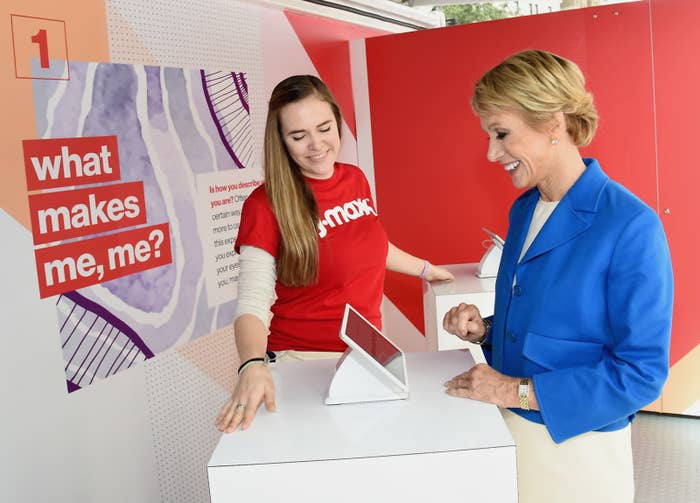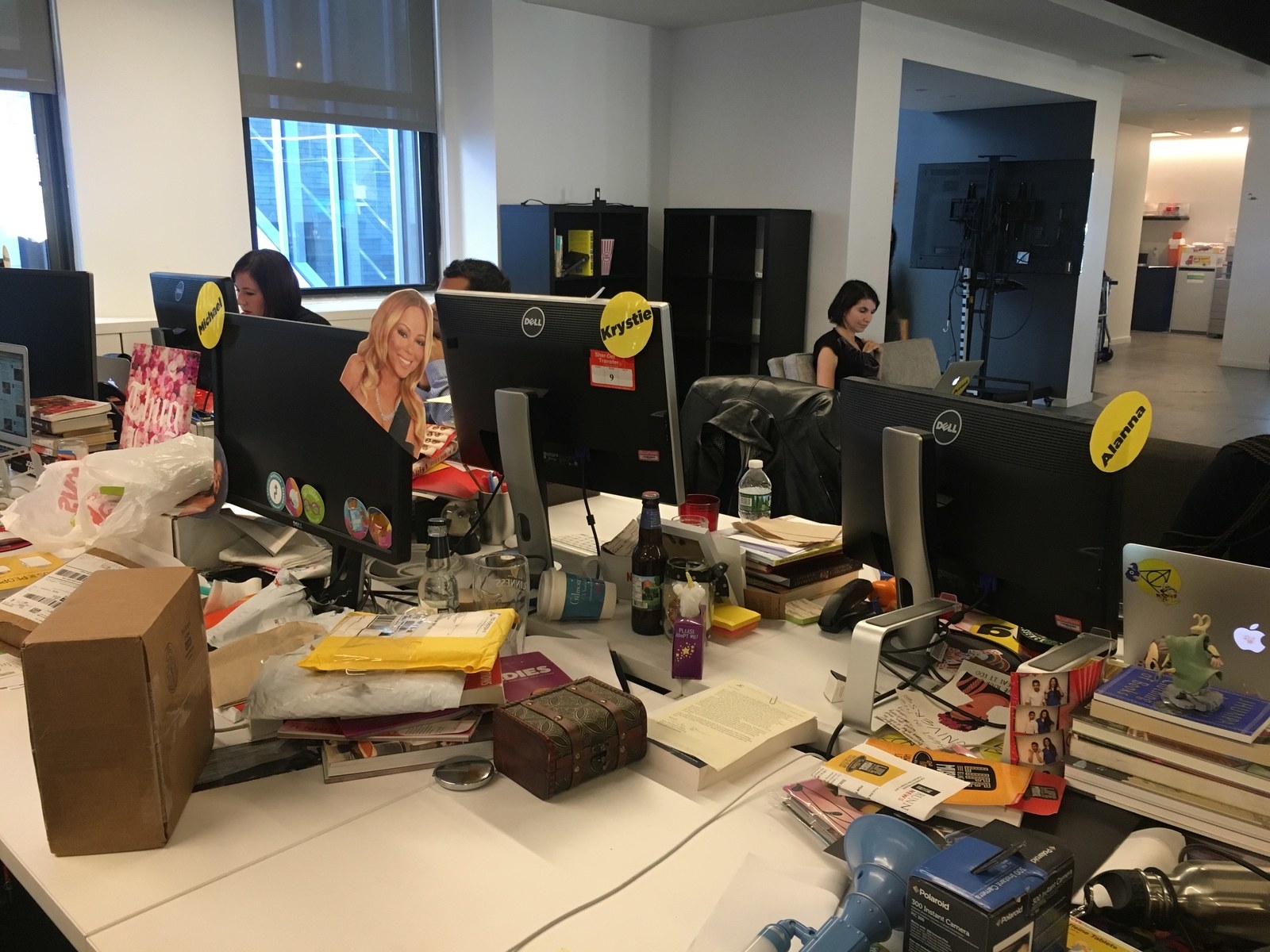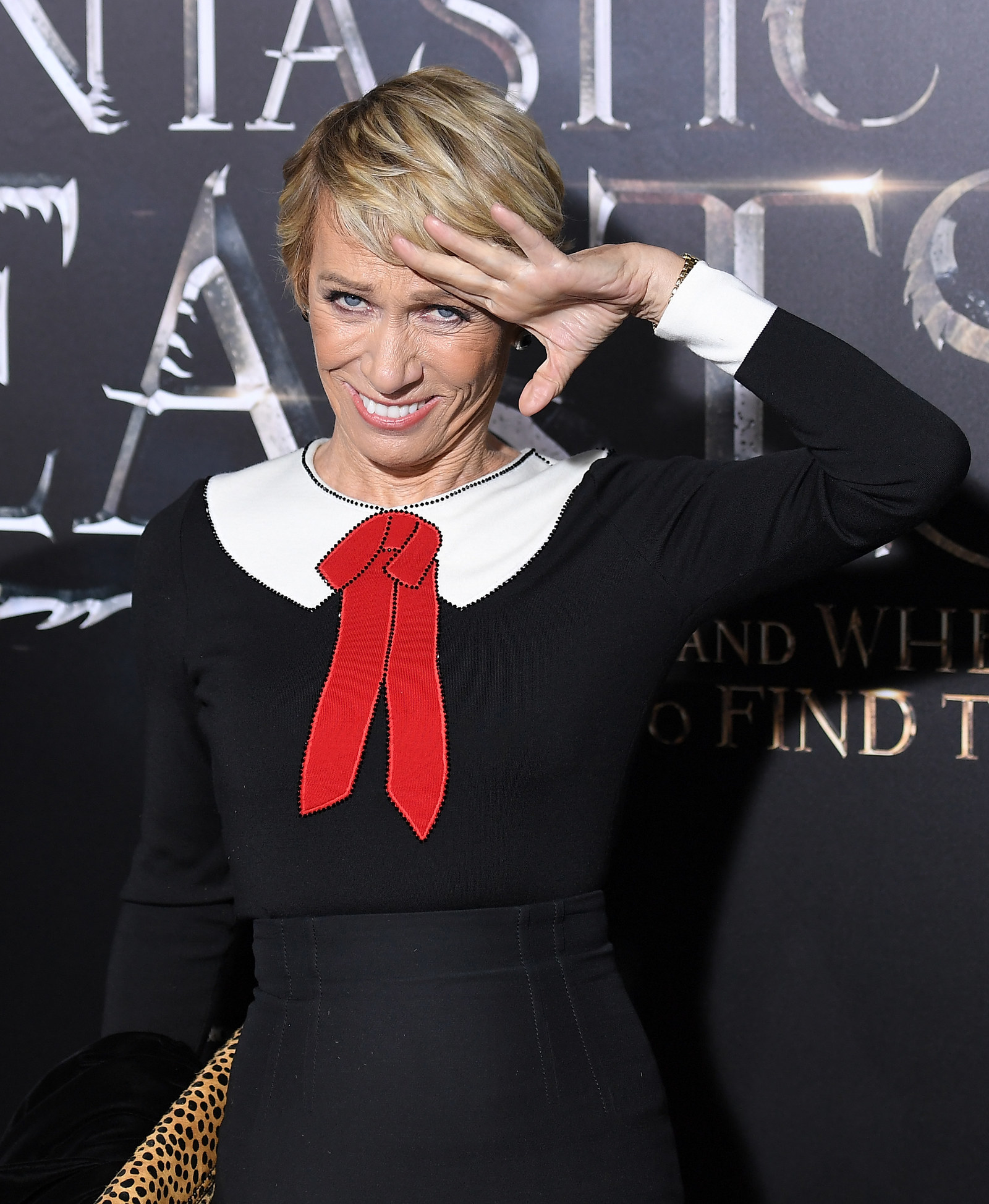
Barbara Corcoran sweeps in, her entourage trailing. "That's a great sign," she says, referring to the canopy outside the entrance to the BuzzFeed building. "Do people tell you that all the time?" She distributes hugs and grasps your arm; you feel like you've known her forever.
Corcoran, a New York City real estate empress who became a household name through her long-running stint on Shark Tank, has dropped by to promote the Maxx You Project Lab, a women's empowerment initiative from the retailer T.J. Maxx. It invites women to take an online quiz to pinpoint their strengths and weaknesses.
The BuzzFeed signage Corcoran admired.

Corcoran, who had taken the quiz just before she visited BuzzFeed, said the results told her she needed to be more "fun-loving," which she earnestly pledged to do.
But she certainly seemed full of mirth as she breezed through our newsroom, waving to fans and admiring the name tags — small, round, and yellow — that the company gives each employee to affix to their computer. "That gives me a business idea," she said. "I want one of them." (I gave her mine.)
Corcoran admired BuzzFeed's yellow employee name tags.

Pixie-like at age 68, Corcoran famously grew up poor and dyslexic in a two-bedroom home where she was one of 10 children, managed with precision and kindness by her strong and relentlessly positive mother. "I had my first job when I was 11," she told the New York Times. "I had 22 jobs before I started a real estate brokerage business when I was 23."
She started that brokerage, the Corcoran Group, with $1,000 in 1973 and sold it for $66 million in 2001. Now she runs a media company that includes her work on Shark Tank (where — between us — many of the companies she invests in don't exactly flourish). Sometimes her work involves visiting BuzzFeed to field questions about women, money, and confidence, like these:
What are the factors that hold women back, personally and professionally?
Barbara Corcoran: I think a lack of knowledge of who you are is a big one. Not investigating yourself, really asking yourself, "What do I do well? What do I do poorly?" Really assessing yourself — I think women don’t take the time to do that.
I think old tapes in your head — of what your parents kind of programmed in about what you should be — becomes who you think you should be, and it’s mistaken. I think peer pressure plays a part. I think roles expected to be played — you know, nice girls aren’t loud, and all that stuff — edits you as you go. What gets lost in the shuffle is the true person: Who are you really?
You say that your mother always gave you positive feedback — never criticism. What do you tell young women who have experienced the opposite?
BC: You mean women who have been criticized their whole life? Let it go. You need to replace that tape in your head with a new one. I had to do it. I had a negative tape in my head — not from my parents, thank god — but from every teacher I ever encountered: "You're not paying attention; you’re stupid."
I had to replace that self-damaging tape on purpose, and I still do it. At this ripe old age, I still do it, when I’m insecure or frightened and think I’ve made a mistake in judgment. I’m like, "Wait a minute, no" — screech halt — and then I say, "You’re amazing!"
Everybody gets down about themselves once in a while. What do you personally do to pick yourself up?
BC: I time myself on feeling sad. I don’t allow myself to feel sorry for myself for long. I mean, it’s a natural inclination when something goes awry that you feel sorry for yourself. Of course, we all do.
But I hear myself and say: Stop. And then I say, "Something good has got to come out of this — what is it?" And I go on a hunt. And you know, there’s something good that can come out of everything.
When I bopped from “Dancing With The Stars”? [Corcoran was the first to be eliminated in the current season of the show.] Let me tell you, I felt like Cinderella, and somebody had robbed her pumpkin. Immediately, I was ashamed of myself. But by the time I got back to New York on that midnight flight, I’m like, “Hey, what’s so bad? I’m going home to my beautiful home and my beautiful family, I got to dance with this hunk for six weeks running, and I know how to dance — this is amazing!"
Corcoran on handling rejection:
View this video on YouTube
What are the biggest mistakes women make with their money?
BC: They don’t spend it. And I know that’s counterintuitive. I am not a believer in saving money. I am a believer in spending money as fast as you can, and believing that more money will come.
That has happened to me my whole life. And I even get that from my mother because even though she could barely make ends meet, she had a firm belief that it would all work out, and it always did. She really taught us to believe that it will all be fine.
A lot of our readers are saddled with a lot of student debt. What is your advice to them about getting on with their life despite this burden?
BC: It’s horrific. You’ve got to be able to departmentalize mentally. The debt is a debt; you’ve got to pay it. You can rework payments, of course, if you need to.
But the idea of letting it overshadow you and be the monkey on your back — the danger to it is not so much the money you owe, but how you’ll avert risk. You won’t take a chance, because you feel the first obligation is to pay back. And you want to know? That’s the least likely way you’ll pay it back.
I know it’s easy for me to say now, but whenever I took a shot at something, it always worked out. It’s like everybody rallied around your flag somehow. Because I think you get rewarded for bravery.
My key piece of advice to budding entrepreneurs? Don’t waste time thinking about it. Get out there and do it!
You've often said that your least favorite people are complainers and those who adopt the victim mentality.
BC: I invest in young businesses, and I would say, out of the 40-some-odd businesses today, I would say one-third are victims. I didn’t know it when I bought them, or I wouldn’t have bought into the business.
But you see they’re victims when things go awry. After the limelight of Shark Tank has faded, after their first order didn’t come through, or they couldn’t deliver on this, they’re either going to be one way — be really tough and go straightforward and get help — or they go the other way and start blaming the next guy. That’s victimizing.
To the women? I’m merciless with them. I say, look at yourself. Is this something you’re going to be proud about? Is this the mother you want your daughter to see? And I’ll go so far as saying, you should be ashamed of yourself.
I get to the point where I almost make them cry, and then I let up on the gas. You know why? Because it’s tough love. We weren’t allowed in our family to cry and be victims. My mother said, "Okay, what are you going to do about it?" It was always, "What are you going to do about it?" — an action step.
There’s nothing more contagious than rubbing shoulders with someone who’s dreaming + will jump over hurdles to make their dream come true.
Isn’t it easy to for women to feel victimized in the workplace, given the realities of sexual harassment?
BC: You might be victimized, but that’s the wrong spin on it. You are compromised because you compromised yourself in somehow explaining it away. It’s easy for me to say, remember, because I haven’t worked for anyone since I was 23. When you’re your own boss, you don’t have to put up with it.
I mean, I certainly had my share of that in the man’s world of New York real estate as a young, pretty woman. I remember one of my two first bosses, who is now deceased, he used to chase me around the desk and lure me up to his office. I found him comical that he had that much confidence in his 82nd year. But he was handsome, debonaire, and he thought he was amazing.
I remember being in many situations where the innuendos— I wasn’t sure if I was hearing it right, initially. But of course you’re hearing it right. When you think you’re right, that’s always it.

What do you think are the job prospects for the current generation, people in their 20s and 30s?
BC: The job market is strong. People are hiring.
I think I find in all the interviewing I do, there are two types of young people: I’m interviewing the scrappy kid, who always had a job here or there, hustled here or there to make a buck, in a nonfancy position in a job that the parent did not arrange. Those are the people I hire.
And then you have the privileged children — and maybe privileged is too strong a word. But you have a lot of children who feel like they are the heir apparent to success. And they’re enormously impatient, and they don’t want to hustle. Those are usually the kids that I’m not hiring, because they’re not going to work hard enough, and they’re too impatient, and I’ve got to make them happy, versus them making me happy.
What are the most interesting things you've learned from doing Shark Tank?
BC: One lesson I’ve learned — which surprised me — is that it’s harder to succeed in business than I ever thought it was. Thank god I didn’t know that the odds of winning are so slim.
I’ve worked with many phenomenal entrepreneurs, and very few really succeed. To really build a business takes a lot of different kinds of smarts from different categories, and a tremendous aggressiveness in wanting to see it through. Or a neediness, or insecurity, about proving something — wherever it comes from. But it’s really tough to succeed in business, and you would think that today it’s easier? No. It’s easier to raise money, not easier to succeed in business.
Tell us why you got involved with the Maxx You Project Lab.
BC: I felt like it was right in line with what I do anyway, which is to inspire women to seek their best self, and then good things come out of it.
In the Lab, you go in and you just quickly pick out what adjectives apply to you — it’s a personality test. When it chewed up all my answers, the results came out, and they nailed me cold.
What did it tell you about yourself?
BC: That I’m not fun-loving anymore. I aspire to be fun-loving, and I forgot about it, and how did they figure that out, with me just pressing all those little adjectives?
So it put me on the straight and narrow. Do you know I’m going to make my number one priority to be more fun-loving, and that’s because I went to the Maxx You Project? It really opened up my eyes, that I had lost that fun-loving piece of life, of myself.
Fun is ALWAYS good for business!


